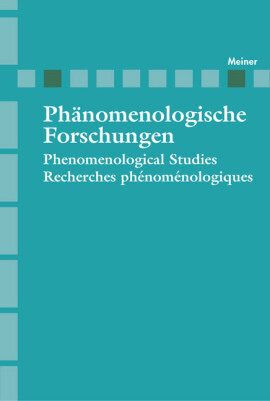
ZEITSCHRIFTENHEFT
Bd. 2008 (2008), Heft 0: Phänomenologische Forschungen 2008
Herausgeber:
Phänomenologische Forschungen, Bd. 2008
(2008)
In diesem Heft

Anschauung als Fundament, Gegenstand und Rechtsquelle der Phänomenologie
Phänomenologische Forschungen, Bd. 2008 (2008), Heft 0 : S. 5–21

Zum Phänomen der Deckerinnerung: Eine Auseinandersetzung zwischen Freud und Husserl
Phänomenologische Forschungen, Bd. 2008 (2008), Heft 0 : S. 23–41

Genèse et transcendantalisation du concept d’,horizon‘ chez Husserl
Phänomenologische Forschungen, Bd. 2008 (2008), Heft 0 : S. 43–70

Die phänomenologische Reduktion und ihre zeitlichen Bedingungen
Phänomenologische Forschungen, Bd. 2008 (2008), Heft 0 : S. 71–88

Grundprobleme endlichen Selbstseins: Husserl, Heidegger, Sartre, Henrich
Phänomenologische Forschungen, Bd. 2008 (2008), Heft 0 : S. 89–111

Rationalität und Subversion in der Zentralperspektive
Phänomenologische Forschungen, Bd. 2008 (2008), Heft 0 : S. 113–125

Der junge Scheler und der Neukantianismus
Phänomenologische Forschungen, Bd. 2008 (2008), Heft 0 : S. 127–145

Heidegger und Platon: Die Dialektik der wahren Aussage in Sophistes
Phänomenologische Forschungen, Bd. 2008 (2008), Heft 0 : S. 147–167

Metaphysischer – Physikalischer – Ästhetischer „Raum“
Dimensionen einer ÄquivokationPhänomenologische Forschungen, Bd. 2008 (2008), Heft 0 : S. 169–181

Husserl at Marquette. A Report on the 38th International Husserl Circle Conference
Phänomenologische Forschungen, Bd. 2008 (2008), Heft 0 : S. 183–192


 Powered by CloudPublish
Powered by CloudPublish